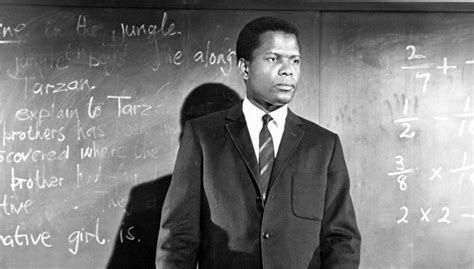TO SIR, WITH LOVE
by Jeemes Aker
Mark Thackeray (played by Sidney Poitier) [entering classroom and seeing smoke] “All you boys, out. Girls stay where you are. Out. [closes door]
Mark Thackeray: “I am sick of your foul language, your crude behavior and your sluttish manner. There are certain things a decent woman keeps private, and only a filthy slut would have done this and those who stood by and encouraged her are just as bad. I don’t care who’s responsible—you’re all to blame. Now, I am going to leave this room for five minutes by which time that disgusting object had better be removed and the windows opened to clear away the stench. If you must play these filthy games, do them in your homes, and not in my classroom.”
One of my friends sent me a note a couple days ago that Sidney Poitier, the iconic Black character actor, had passed away at the age of 94.
I replied by saying that Poitier’s movie role as a teacher—Mark Thackeray—literally changed my life. In the movie (1967), Thackery was an American engineer who couldn’t get a job in his chosen field and (to make ends meet) instead took a teaching job in a rough-and-tumble London East End school populated by troublemakers, many of whom were booted from other schools for their behavior.
What happens next is little short of magic and a testimony to the resilience of the human spirit.
As an aside, the movie’s screenplay was written by one of my favorite writers, James Clavell. He also directed the movie. Clavell’s life story is absolutely amazing. He was a British teenage artillery officer in Java during World War II, captured by the Japanese and spent three years in two POW camps, including the notorious Changi camp in Singapore.1 His book King Rat (1962) is based on the experience. Writing about the POW camp experience became a catharsis of sorts and Clavell became a serious student of Japan and the Far East. The result: the so-called “Asian Saga novels”: Tai-Pan (1966), set in early Hong Kong; Shogun (1975), set in 17th century Japan and topic of one of television’s most successful TV miniseries; Noble House (set in Hong Kong in the early 1960’s); and Gai-Jin (1993) set in Japan in 1862.
If you have a love for Asia, I highly recommend all of these books.
I wonder what Clavell—who died in 1994 at 72 years of age—would think now about what has happened to the Hong Kong he loved so much. In brief, over the course of 18 months Beijing’s authoritarian rulers succeeded in completely snuffing out a once thriving bastion of democracy.
(Warning Will Robinson!!! It could happen here).
Jeemes, what’s the deal? You start out talking about an iconic 1967 movie and then end up in Hong Kong.
None of my college students would be surprised at the transition. In one history class I was lecturing on Napoleon Bonaparte and by the end of the class we were talking about flying saucers and UFOs.
Go figure.
At any rate, back to “To Sir, With Love.”
I simply cannot imagine generations of teachers entering the classrooms these days without being motivated by the movie “To Sir, With Love.” For me, the movie was perfect in every way: from the emotional lyrics of Lulu’s hit song by the same name; to a teacher’s determination to lift the students out of their cultural and societal malaise; to teaching lasting lessons of courage; to overcoming racial prejudice and stereotypes; to coping with the passions of young love—ah, the movie has it all.
The movie stirred the first glowing embers in my teacher’s heart.
In addition, the movie introduced me to the importance of social justice—the need for individuals of all colors to have an equal opportunity to succeed.
Whatever happened to that concept?
I wonder what would happen if “To Sir, With Love” was filmed today with a classroom full of Generation Y and Z’ers? The kids would be wearing masks, texting on their cellphones, and the thorny problems of racial injustice and the social caste system replaced by weightier issues such as climate change and gender identity. Thackeray would face threats of law suits from parents and his tactics limited by mandates from politically correct local school boards. There would be zero respect for his authority, either in the classroom or within the community. Most of the students would be siphoned off to special ed classes.
Even the name of the school itself would be changed as a concession to woke activists.
I’m sure each of you could add to the list.
As a teenager, Sidney Poitier was one of my favorite actors.
Of course, his role as a Black teacher fighting against all odds to improve the lives of his students in “To Sir, With Love,” remains my favorite. No matter how many times I have seen the movie, I’ll watch it again when trolling through the channels and Lulu’s song during the dance scene at the end of the movie still brings tears to my eyes.
Every time.
“Sigh.”
Poitier also played police detective Virgil Tibbs in the movie “In The Heat of the Night” (1967), set in the Deep South. One of the movie’s most memorable scenes was when Tibbs responded immediately to being struck by a white man with a backhanded slap of his own—signifying to thousands of young black men that you can’t just do anything to us.2 As sociologist Rodney Coates notes: “I am one of those growing up who was able to see a strong, positive Black man on the screen whose roles were powerful and sent the message that Black people matter, that we are to be respected.”3
Poitier’s first role was in a 1950 film called “No Way Out” in which he played a Black doctor in a white hospital and accused of malpractice by a white family. It was a breakthrough role.
According to one prominent television producer, Poitier brought to the screen three-dimensional characters, portraying Black people as people, not caricatures.4
When not on the screen, Poitier was a champion for civil rights.
In an age when liberal leaders are far better at accommodating poverty than facilitating upward mobility,5 when neo-Marxists have infiltrated and hijacked the Black Lives Matter movement, when urban areas are burning, stores are ransacked with impunity, and the dream of Martin Luther King Jr. is drowned out by race-hate hucksters, we miss strong Black men of integrity on the screen and as role models.
Sidney Poitier has been elbowed aside by the likes of Reverend Al Sharpton.
Spend an evening with the kids, microwave some popcorn and watch “To Sir, With Love” instead of the latest zombie apocalypse flick on the screen.
And talk to them about ideas worth thinking …




